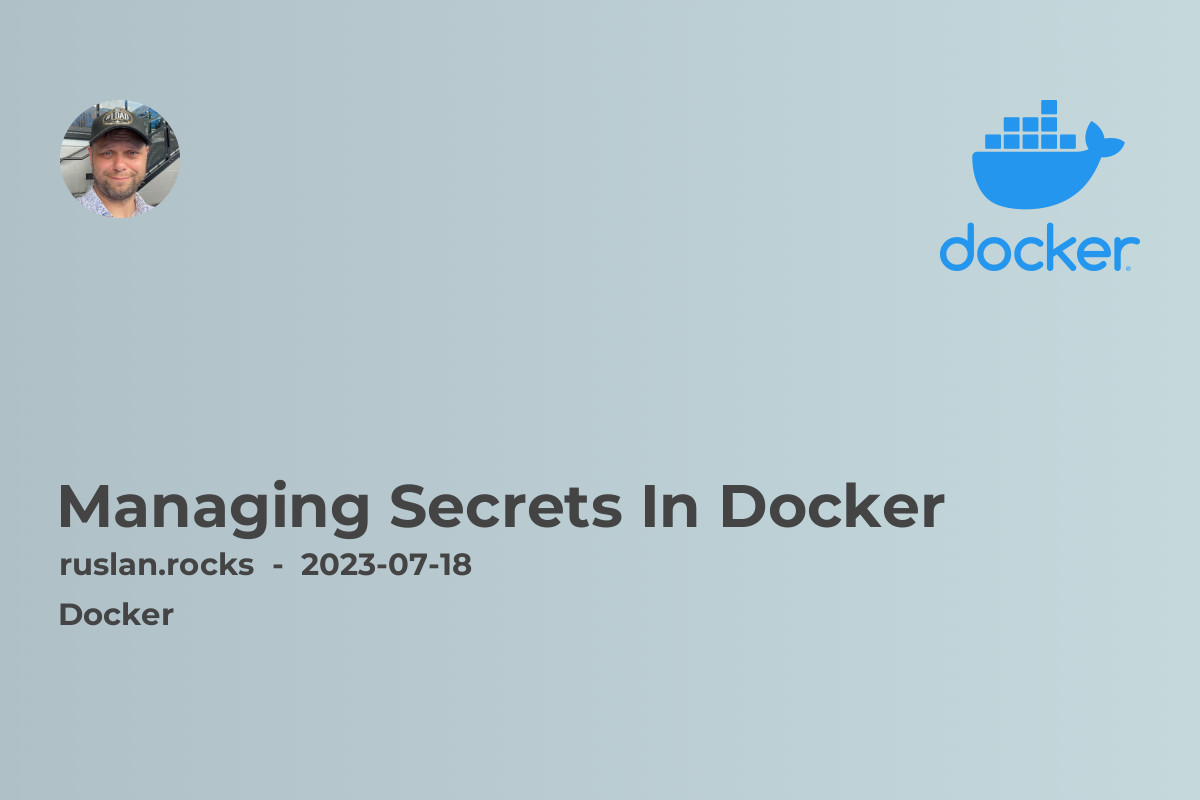- Why Are Secrets Important in Docker Containers?
- Using Docker Secrets
- External Secrets Management Tools
- Best Practices for Managing Secrets in Docker
- Related Articles

Docker has become one of the most popular containerization platforms, allowing developers to package their applications and dependencies into portable units. However, managing sensitive information like passwords, API keys, and certificates within Docker containers can be challenging. In this article, we will explore best practices and tools for managing secrets in Docker, ensuring the security of your data.
Why Are Secrets Important in Docker Containers?
Docker containers are designed to be lightweight and easily replicable, making them a convenient choice for deploying applications. However, this portability also introduces the risk of exposing sensitive information to unauthorized users. Secrets, such as database credentials or access keys, are vital for applications to function properly. Therefore, safeguarding this data should be a top priority for developers.
Using Docker Secrets
Docker provides a built-in feature called "Docker Secrets" to securely manage sensitive information. With Docker Secrets, you can store and distribute secrets to containers without exposing them in plain text. This ensures that the secrets remain protected even if the container is compromised.
To create a Docker secret, use the following command:
$ echo "mysecretpassword" | docker secret create my_secret_password -
You can then reference the secret in your Docker Compose or Dockerfile using its name. For example:
version: "3"
services:
myapp:
image: myapp:latest
secrets:
- my_secret_password
External Secrets Management Tools
While Docker Secrets provides basic functionality, you may need a more robust solution depending on your organization's requirements. Several external tools can help you manage secrets in Docker effectively. Here are a few popular options:
-
Vault: HashiCorp Vault is a secure storage and secrets management tool. It offers advanced features like encryption, auditing, and access control policies. By integrating Vault with Docker, you can store and retrieve secrets in a centralized and secure manner.
-
SOPS: SOPS is a command-line tool that provides encryption and decryption of files for use with Docker Secrets. It allows you to transparently encrypt your secrets before storing them in Git and other source control systems.
-
Conjur: Conjur by CyberArk is an enterprise-grade secrets management platform. It provides features like auditable access controls, role-based permissions, and integrations with popular container platforms like Docker and Kubernetes.
-
Keywhiz: Keywhiz is an open-source, centralized secrets management system developed by Square. It provides a secure, scalable, and straightforward way to store and distribute secrets to your Docker containers.
Best Practices for Managing Secrets in Docker
To ensure the security of your secrets and Dockerized applications, consider following these best practices:
-
Avoid hardcoding secrets in Docker images: Hardcoding secrets directly into your Docker images undermines the purpose of secrets management. Instead, use environment variables or secret mounting techniques to inject the necessary information into the containers at runtime.
-
Limit access to secrets: Follow the principle of least privilege to ensure that only authorized users or services can access secrets. Implement proper access controls and encryption mechanisms to protect your secrets from unauthorized access.
-
Regularly rotate secrets: Regularly rotating secrets, such as passwords or access keys, reduces the risk of malicious actors obtaining long-term access to your systems. Automate the secret rotation process to ensure consistent security practices.
-
Encrypt secrets at rest and in transit: Ensure that your secrets are encrypted both at rest and in transit. Encrypting secrets when they are stored and transferred adds an extra layer of protection against unauthorized access.
-
Monitor and audit secrets: Implement monitoring and auditing mechanisms to detect and respond to any unauthorized access attempts or suspicious activities related to your secrets. Regularly review your logs to identify potential security incidents.
These practices, combined with the proper use of Docker Secrets or external secrets management tools, will help you maintain the security and integrity of your secrets within Docker containers.
Related Articles
Here are some additional articles that you might find useful:
- Docker Compose Is Not A Docker Command: Learn about the distinctions between Docker commands and Docker Compose.
- Docker Volumes: Managing Data in Containers: Discover how to manage data persistence in Docker containers.
- Docker Security Best Practices: Ensuring Container Security: Understand the best practices for securing your Docker containers against potential threats.
By leveraging the information from these articles, you can enhance your understanding of Docker and take full advantage of its capabilities while ensuring the security and integrity of your applications.
